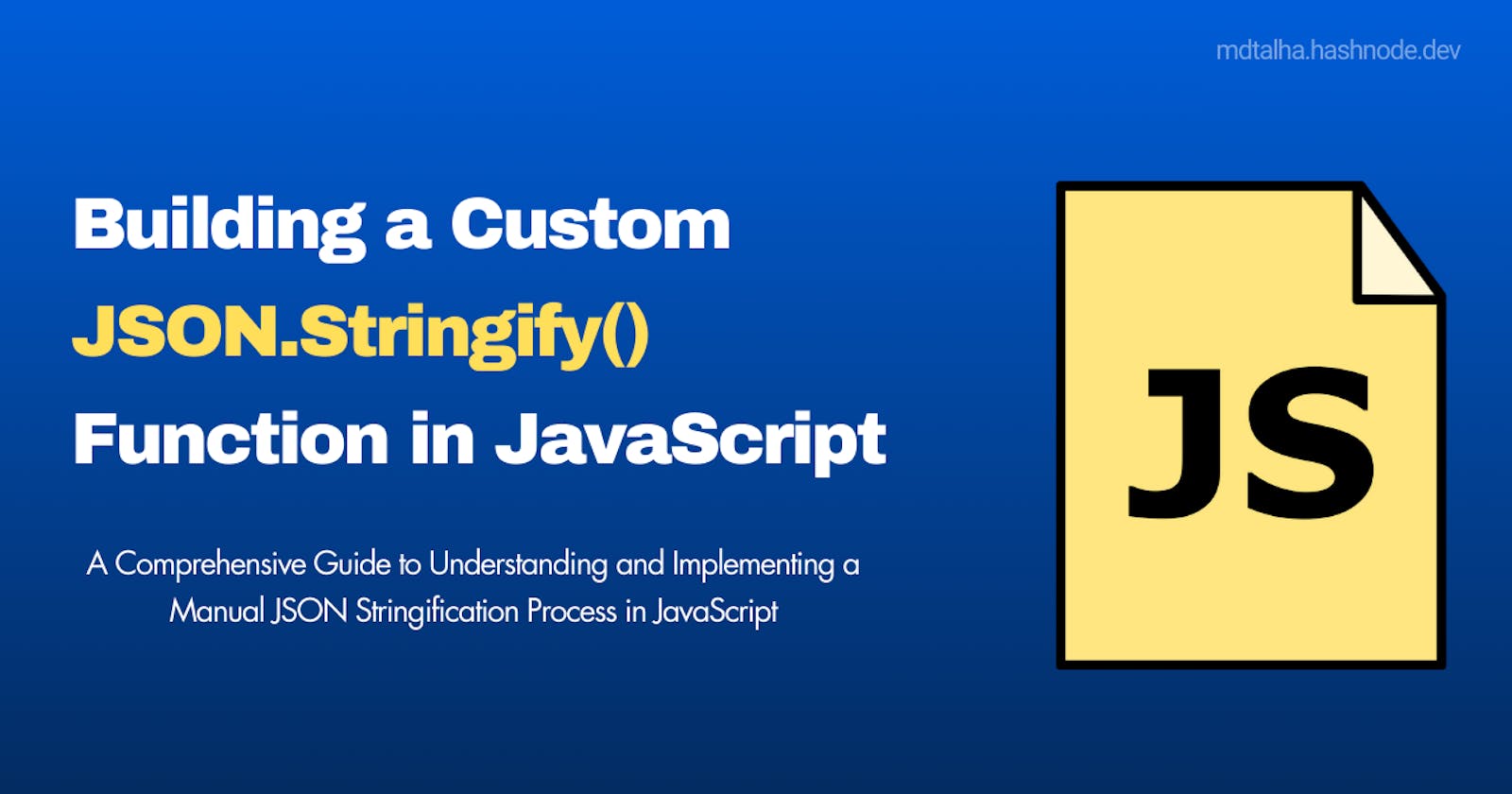Building a Custom JSON Stringify Function in JavaScript
A comprehensive guide to understanding and implementing a custom JSON stringification process in javaScript
JSON (JavaScript Object Notation) is a widely used data interchange format that allows easy data exchange between different programming languages. In JavaScript, the JSON.stringify() method is commonly used to convert JavaScript objects into JSON strings. However, understanding how to manually implement a JSON stringify function can deepen your understanding of JavaScript and serialization processes. In this blog post, we'll explore the inner workings of a custom JSON stringify function, step by step.
Understanding JSON and serialization:
Before diving into the implementation, let's briefly review JSON and the serialization process. JSON is a lightweight data interchange format that is easy for humans to read and write, and easy for machines to parse and generate. Serialization is the process of converting an object into a format that can be easily transmitted or stored.
Basics Requirements:
Our custom JSON stringify function should handle various data types, including objects, arrays, strings, and primitive types. To achieve this, we'll need to recursively traverse the input data and build the corresponding JSON string.
let's break it down and understand it by implementing the customStringify function which will behave similarly to JSON.stringify().
Part 1: The basic structure of implementation:
function customStringify(value) {
if (typeof value === 'object' && value !== null) {
// Handle objects and arrays
// ...
} else if (typeof value === 'string') {
// Handle strings
// ...
} else {
// Handle other primitive types
// ...
}
}
The function
customStringifytakes avalueparameter, representing the JavaScript value to be converted into a JSON string.It begins with a check to determine if the
valueis an object (excludingnull).Depending on the type of the value, it will follow different branches to handle objects, arrays, strings, and other primitive types.
Part 2: Handling Objects and Arrays
Let's write the logic for handling the array first:
function customStringify(value) {
if (typeof value === 'object' && value !== null) {
// handle array
if (Array.isArray(value)) {
let result = '[';
for (let i = 0; i < value.length; i++) {
if (i > 0) {
result += ',';
}
result += customStringify(value[i]);
}
result += ']';
return result;
}
// TODO: handle object
} else if (typeof value === 'string') {
// TODO: handle string input
} else {
// TODO: handle other input type
}
}
This part of the code checks if the value is an array using Array.isArray(value).
If it is an array, it iterates through each element, recursively calling customStringify on each element, and building the resulting string.
Now, we have handled array input, but in javascript, both array and object are of type 'object' only, so if this condition if (typeof value === 'object' && value !== null) passed, it means the value can be an array or an object, but we already handled the case of an array, so now let's handle the case of an object.
function customStringify(value) {
if (typeof value === 'object' && value !== null) {
// handle array
if (Array.isArray(value)) {
// implementation to handle array
}else {
// handle object
let result = '{';
let first = true;
for (let key in value) {
if (value.hasOwnProperty(key)) {
if (!first) {
result += ',';
}
result += '"' + key + '":' + customStringify(value[key]);
first = false;
}
}
result += '}';
return result;
}
} else if (typeof value === 'string') {
// TODO: handle string input
} else {
// TODO: handle other input type
}
}
- If the
valueis an object, it iterates through its properties, recursively callingcustomStringifyon each property value, and building the resulting string with key-value pairs.
Part 3: Handling string and other primitive types.
function customStringify(value) {
if (typeof value === 'object' && value !== null) {
// handle array and object type
} else if (typeof value === 'string') {
// Handle strings
return '"' + value + '"';
} else {
// Handle other primitive types
return String(value);
}
}
If the
valueis astring, it encloses the string within double quotes and returns the result.If the
valueis any other primitive type, it converts it to a string usingString(value)and returns the result.
Final code:
function customStringify(value) {
if (typeof value === 'object' && value !== null) {
if (Array.isArray(value)) {
// Handle arrays
let result = '[';
for (let i = 0; i < value.length; i++) {
if (i > 0) {
result += ',';
}
result += customStringify(value[i]);
}
result += ']';
return result;
} else {
// Handle objects
let result = '{';
let first = true;
for (let key in value) {
if (value.hasOwnProperty(key)) {
if (!first) {
result += ',';
}
result += '"' + key + '":' + customStringify(value[key]);
first = false;
}
}
result += '}';
return result;
}
} else if (typeof value === 'string') {
// Handle strings
return '"' + value + '"';
} else {
// Handle other primitive types
return String(value);
}
}
// Example usage
const obj = { name: 'Harry', age: 30, city: 'India' };
const jsonString = customStringify(obj);
console.log(jsonString);
